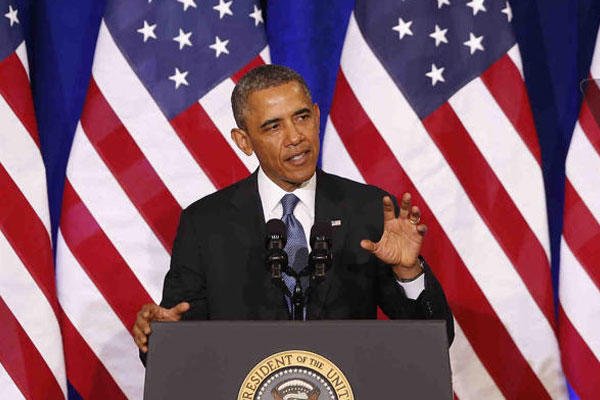President Obama said in a speech at the Department of Justice on Friday that the U.S. will not spy on the leaders and governments of friends and allies. The president also said authorization from a secret surveillance court will be required before government agencies are allowed to spy on or review data collected on American citizens.
Obama said the changes he is recommending will bring greater transparency to U.S. intelligence gathering operations, assure Americans' rights are not violated by government overreach, and rebuild the trust of allies.
"The United States does not collect intelligence to suppress criticism or dissent, nor do we collect intelligence to disadvantage people on the basis of their ethnicity, race, gender, sexual orientation, or religious beliefs," Obama said. "And we do not collect intelligence to provide a competitive advantage to U.S. companies, or U.S. commercial sectors. "
The president said that he had called for a "more robust" discussion of U.S. intelligence issues even before former NSA contract analyst Edward Snowden released thousands of classified and secret documents to the media revealing that U.S. agencies were engaging in intel operations outside the scope claimed by the government.
Among the revelations in the documents is that the U.S. was intercepting the phone calls and emails of foreign leaders, including allies, and collecting massive amounts of data on American citizens.
Obama was emphatic that U.S. intelligence officials and analysts are not deliberately engaging in any wrongful activity.
"The men and women of the intelligence community, including the NSA, consistently follow protocols designed to protect the privacy of ordinary people," he said. "They are not abusing authorities in order to listen to your private phone calls, or read your emails. When mistakes are made -- which is inevitable in any large and complicated human enterprise -- they correct those mistakes."
Obama also reiterated the government's contention that the NSA's massive collection of metadata on American telephone communications, collected from telephone providers, does not include names of callers or the content of the calls -- only the numbers called, the time they are made and the length of the calls.
Obama defended the value of the metadata as agencies look to intercept and counter possible terror plots, but conceded there are problems with the way the U.S. has handled it.
"I am therefore ordering a transition that will end ... bulk metadata program as it currently exists, and establish a mechanism that preserves the capabilities we need without the government holding this bulk metadata," he said.
Whether the solution is leaving the data with the companies that hold it, turning it over to a third-party, or some combination, has yet to be determined. Obama said each option has its own issues of access and privacy.
In the meantime, Obama said he has ordered -- effective immediately -- intelligence agencies to only pursue phone calls "that are two steps removed from a number associated with a terrorist organization instead of three."
Additionally, the collected metadata may now be accessed and queried only after a judicial finding, or in a true emergency, he said.
Obama said this is only a transition period while a new means of holding the data is developed.
He instructed the intelligence community and Attorney General Eric Holder to report back to him with options before the program comes up for reauthorization on March 28.
Another change he outlined on Friday would establish an outside panel that could review warrant requests by the NSA to the Foreign Intelligence Surveillance Court when necessary and provide an outside opinion.
Currently the court, which meets and rules in secret, hears only the arguments made by the NSA; critics have claimed that, since 9/11, the FISA court has become a rubber stamp for the NSA. Often NSA has secured an "umbrella authorization" that has enabled analyst to cull through data on thousands of Americans without specific FISA authorization.
"That is no longer an issue that is dealt with within NSA. They have to bring that [specific request] to the FISA court" under Obama's plan, a White House official speaking on background said shortly before Obama spoke.
Obama also acknowledged a need for greater transparency in the area of National Security Letters, which the government uses to collect information and data from individuals or companies without the need of a warrant.
The changes would include some kind of shelf-life on the letters so they do not remain secret indefinitely. Another change would loosen the "gag order" that requires those hit with a NSL to keep silent about it.
Obama's change, once effected, will allow those served with NSLs to give the public more information about the orders and data they were required to provide the government.
In response to revelations that the U.S. was spying on foreign leaders, including allies, Obama said he has made clear to the intelligence community that "unless there is a compelling national security purpose -- we will not monitor the communications of heads of state and government of our close friends and allies."
That doesn't mean the U.S. will not continue to collect information to gauge "the intentions of governments," since that is something all governments do.
"We will not apologize simply because our services may be more effective. But heads of state and government with whom we work closely, and on whose cooperation we depend, should feel confident that we are treating them as real partners. The changes I've ordered do just that," Obama said.
Defense Secretary Chuck Hagel added that he supported the intelligence reforms in a statement issued shortly after the president's speech.
"These programs must always balance the need to defend our national security with the responsibility to preserve America's individual liberties, and the President's decisions and recommendations will do that," Hagel said. "They will help restore the confidence of the American people and our allies and partners. They will preserve important capabilities that keep us safe."





























